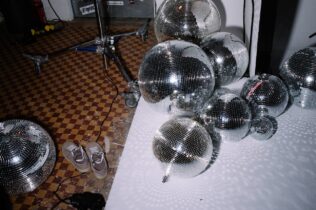
Photo by Jorge Urosa.
We saw your offsite photos on LinkedIn. The ones where you were all gathered around a table at a swanky restaurant. The ones from Mexico City, where everyone was in sunglasses and colorful outfits. And the ones of the conference room, covered in post-it notes and coffee mugs.
It seemed like a good time. The text accompanying the pictures touched all the 2023 offsite bases. It was great to see the team. It was really nice to connect in person. You left the offsite feeling energized. And refreshed. And excited about the rest of the year.
As folks who came up in the first generation of globally distributed work, we know just how powerful that in-person time together can be. Many orgs have committed to a long-term hybrid or fully remote strategy. These regular offsites are essential for maintaining an engaged and aligned workforce. And this means pretty high stakes for the people who plan them.
Any time you bring an entire org of people together, there’s significant risk. Risk they won’t have fun. Risk they will all hide in their hotel rooms the whole time. Risk that three drink tickets in, someone on the sales team and someone on the eng team will decide they need to get something off their chests. Risk that the team will complain when they get two drink tickets instead of three the next night.
It makes good sense that offsite organizers spend a bunch of time on the structure and the flow. That’s how you get those smiling social posts with happy colleagues and conference rooms full of post-it notes.
There’s nothing wrong with dinners together or post-it notes or international jaunts. We love all of this. But there’s a massive difference between an offsite that is pleasant and one that’s downright transformational.
Good stuff will happen
We’ve been to offsites that changed how a team gelled for years afterwards. Ones that rewrote the direction and culture of the whole organization. And the lasting impact of every enduring offsite we’ve ever seen comes from one of two places.
-
I had an important conversation
-
We did some great work together
The underlying theory for every offsite is sort of implicitly based on trying to make these things happen. We want our people to connect. And if we get our people together in person, in an interesting destination, away from their regular day-to-day and close to coffee and pastries, Good Stuff Will Happen.
It will just… happen.
The Good Stuff Will Happen Theory of Offsite Planning (GSWHTOP?) draws from a real truth. Most people want to build authentic connection with their colleagues. We love connection and, if the conditions are right and you get out of our way, we will often get there on our own.
If you get 100 people together for an offsite that is run well, you’ll leave with a dozen good stories. Of people finally meeting for the first time. Of projects that sat idle for years suddenly taking shape over three hours sitting on the ground in a hotel hallway. They will be cool, scrappy, stories about moments of connection that just happened. And confirmation bias says that we’ll feel good about the offsite, because of those dozen stories.
But what about everybody else?
Making good stuff happen
The offsite planning committee deserves a break. It’s a giant pain in the ass to coordinate catering and travel and keynote slides and visas and wifi and transportation and decor and seriously where are the keynote slides and allergies and childcare and cancellations and spare chargers and COVID precautions and those giant post-it note easel things and damnit Jeremy where are the keynote slides and badges and room assignments and comfortable seating. By the time you have all made it to the place and have coffee and pastries in hand, they have done enough.
To make the offsite do its job, the rest is on you. You don’t need to cross your fingers, or light a candle and wish on the GSWHTOP. We’re going to make our own magic from now on. And it starts with the key elements to an enduring offsite:
-
I had an important conversation
-
We did some great work together
The best thing you can do. The magical transformative thing you can do to improve your odds that something amazing will happen. Is to think ahead.
So two weeks out, before anyone has boarded a flight or even packed a bag, find 15 minutes. Ask yourself what conversations you’ve been meaning to have. Need prompts? We’ve got some to get you started.
-
Who’s new to the team that you’ve been meaning to sit down with?
-
Where does your team bump up against another team — either in active conflict or just uncomfortable overlap? What’s the conversation you need to have to talk that through?
-
Who do you need to say thank you to? And how clear can you be about what their impact was?
-
Who do you need to say sorry to? You know, like a grown up.
-
Who is excellent at something you want to be better at, and what questions do you have for them?
There are hundreds more, of course. Ditto for the great work you could do if you had all your amazing colleagues in the same place and some unstructured time together. Once you’ve made your list, encourage your team to do the same. Paste this newsletter at them with exclamation points and fire emoji. Ask your boss who else you’re forgetting. Whatever it takes to build yourself a solid set of ideas and opportunities.
We know. We’re writing this as a pair of introverts (quiet room represent!) and what could be more introvert-cliché than planning your social interactions weeks ahead of time? But offsites are distracting, sometimes jet-laggy, always sleep-deprived, energy-intensive affairs. Whether you’re introverted, extroverted, ambiverted or disconcerted, your ability to make meaningful connections in the midst of all that will benefit from some pre-work.
We don’t promise that you’ll get to every bullet on your list. But if you only got to three, and so did everyone else, your offsite would have hundreds of incredible stories instead of a dozen. That’s when the good stuff happens.
—
PS – You don’t actually need to wait for the next offsite. Not to ask yourself those questions up there, and not to have those conversations either. They’re useful any time you’re in close proximity to the humans you work with. If that’s daily, great. If that’s every third Thursday, cool. And if it’s once or twice a year in a hotel conference room, well, then this whole newsletter has been for you.
– Melissa and Johnathan






